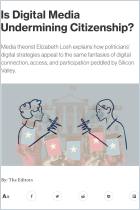Join getAbstract to access the summary!

Join getAbstract to access the summary!
McKay Coppins
The Billion-Dollar Disinformation Campaign to Reelect the President
How new technologies and techniques pioneered by dictators will shape the 2020 election
The Atlantic, 2020
What's inside?
Donald Trump’s technologically sophisticated disinformation-based reelection campaign is transforming American politics.
Recommendation
One day, investigative reporter McKay Coppins created a fake Facebook account and clicked “Like” on Donald Trump-related pages. Bombarded with pro-Trump propaganda, Coppins was surprised at how this constant stream of disinformation succeeded in making him question facts he knew to be true. Coppins went on to investigate the people and the tactics behind Trump’s expansive and well-orchestrated campaign to drown out the political messages of the president’s Democratic challengers. What he discovered will frighten everyone concerned about the future of democracy in the age of the internet.
Summary
About the Author
McKay Coppins is a staff writer at The Atlantic and the author of The Wilderness, a book about the future of the Republican Party.




















Comment on this summary